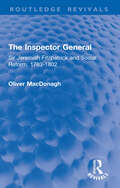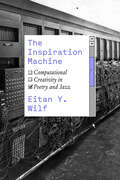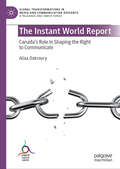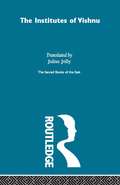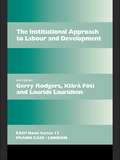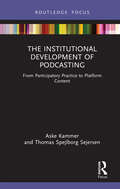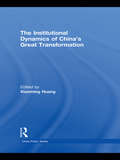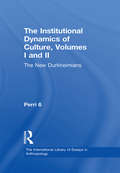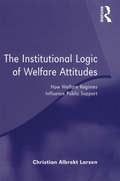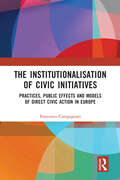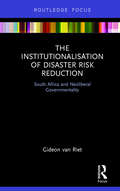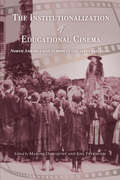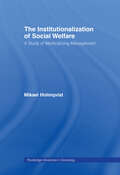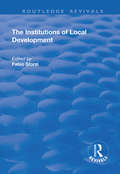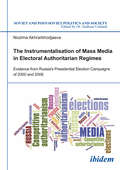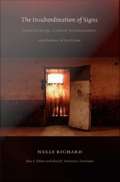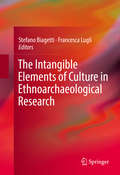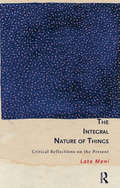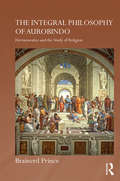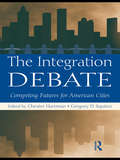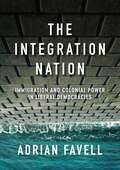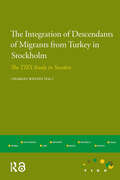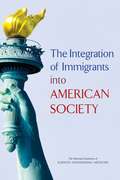- Table View
- List View
The Inspector General: Sir Jeremiah Fitzpatrick and Social Reform, 1783-1802 (Routledge Revivals)
by Oliver MacDonaghSir Jeremiah Fitzpatrick (c.1740-1810) was the first inspector general of prisons and lunacy inspector in Ireland and the first and only inspector of health to HM land forces in Great Britain. He also inspected convict vessels bound for New South Wales and the East India Company‘s troop ships, inquired into the Irish Charter Schools and attempted to alleviate the miseries of soldiers’ dependents. His further ambitions ranged from a poor law for Ireland to a reorganisation of Dublin’s police, to the regulation of noxious trades, from slave trade inspectorates to hospital management. He was therefore in many ways a precursor of the titans of early and mid-Victorian government. Originally published in 1981, much of the interest of the book lies in its revelation of late eighteenth century anticipations of mid-nineteenth century government. It also explores the differences between the two forms of administration and the reasons for the divergences and discontinuities.
The Inspiration Machine: Computational Creativity in Poetry and Jazz
by Eitan Y. WilfExplores how creative digital technologies and artificial intelligence are embedded in culture and society. In The Inspiration Machine, Eitan Y. Wilf explores the transformative potentials that digital technology opens up for creative practice through three ethnographic cases, two with jazz musicians and one with a group of poets. At times dissatisfied with the limitations of human creativity, these artists do not turn to computerized algorithms merely to execute their preconceived ideas. Rather, they approach them as creative partners, delegating to them different degrees of agentive control and artistic decision-making in the hopes of finding inspiration in their output and thereby expanding their own creative horizons. The algorithms these artists develop and use, however, remain rooted in and haunted by the specific social predicaments and human shortfalls that they were intended to overcome. Experiments in the digital thus hold an important lesson: although Wilf’s interlocutors returned from their adventures with computational creativity with modified, novel, and enriched capacities and predilections, they also gained a renewed appreciation for, and at times a desire to re-inhabit, non-digital creativity. In examining the potentials and pitfalls of seemingly autonomous digital technologies in the realm of art, Wilf shows that computational solutions to the real or imagined insufficiencies of human practice are best developed in relation to, rather than away from, the social and cultural contexts that gave rise to those insufficiencies, in the first place.
The Instant World Report: Canada's Role in Shaping the Right to Communicate (Global Transformations in Media and Communication Research - A Palgrave and IAMCR Series)
by Aliaa DakrouryThis book proposal focuses on Canada's pioneering role in shaping the international understanding of the right to communicate, particularly through the Canadian Telecommission Studies of 1969. The study argues that the 1971 Instant World report, a landmark document, has been overlooked in the existing literature despite its importance in the history of conceptualizing and implementing this human right. The project aims to fill this gap by exploring the historical context of the report and analyzing its contents, shedding light on themes like privacy and indigenous communication rights. Additionally, the manuscript highlights the unique contribution of Betty Zimmerman, the only female Canadian member of the MacBride Commission in 1977, replacing Marshall McLuhan. Zimmerman's insights become pertinent not only for scholars interested in the New World Information and Communication Order but also for feminist studies, showcasing a leading female figure's role in Canadian communication and cultural policy. The research promises a novel and untold perspective on the history of the right to communicate, addressing gaps in international and Canadian communication, women’s studies, and media policy literature.
The Institutes of Vishnu: The Sacred Books Of The East V7
by Julius JollyThis is a subset of F. Max Mullers great collection The Sacred Books of the East which includes translations of all the most important works of the seven non-Christian religions which have exercised a profound influence on the civilizations of the continent of Asia. The works have been translated by leading authorities in their field.
The Institutional Approach to Labour and Development (Routledge Research EADI Studies in Development #No. 17)
by Gerry Rodgers Klárá Fóti Laurids LauridsenBringing together the work of economists and sociologists in research programmes in a number of European institutions concerned with development, this collection analyses how social institutions contribute to an understanding of development.It shows how labour markets, labour relations and employment patterns respond to institutional forces, and thereby shape development paths and determine how different groups benefit from economic growth.
The Institutional Development of Podcasting: From Participatory Practice to Platform Content (Disruptions)
by Aske Kammer Thomas Spejlborg SejersenReferring back to the early 2000s, this book traces the development of podcasting from a “do-it-yourself” medium by amateurs into its current environment, where a wide variety of individuals, organizations, and platforms operate in an increasingly crowded and competitive market.Through original case studies of shows and platforms including "The Daily" and Spotify, the authors explore the processes and effects of commercialization, platformization, and datafication in the industry. Drawing on institutional theory and the growing body of scholarly literature about podcasting, they examine the shifts and reorientations in institutional logics that characterize podcasting and present the different types of actors that operate in the commercial and noncommercial podcast markets.The Institutional Development of Podcasting will be of interest to advanced students and researchers of audio media, journalism, and media industries.
The Institutional Dynamics of China's Great Transformation (China Policy Series)
by Xiaoming HuangThis book examines the role of institutions in China’s recent large-scale economic, social and political transformation. The book argues that, although the importance of institutions in China’s rapid economic growth and social development over the past 30 years is widely acknowledged, exactly how institutions affect changes in particular national and historical settings is less well understood. Unlike existing literature, it offers perspectives from a variety of disciplines - including law, economics, politics, international relations and communication studies – to consider whether institutions form, evolve and change differently according to their historical or cultural environments and if their utilitarian functions can, and should be, observed, identified and measured in different ways. The book discusses China’s political and legal institutions; the international institutions with which China engages; institutions promoting science and technology; media companies; and local institutions including the household registration system. It also examines how institutions themselves have been formed, changed and re-formed over recent decades, and suggests theoretical and methodological adjustments in institutional analysis to allow a fuller understanding of the institutional dynamics of China’s transformation.
The Institutional Dynamics of Culture, Volumes I and II: The New Durkheimians (The International Library of Essays in Anthropology)
by Perri 6These two volumes present the most important recent developments in the institutional theory of culture and demonstrate their practical applications. Sometimes called 'grid-group analysis' or 'cultural theory', they derive from the work of Durkheim in the 1880s and 1900s and develop the insights of the anthropologist Mary Douglas and her followers from the 1960s on. First redefined within social and cultural anthropology, the theory's influence is shown in recent years to have permeated all the main disciplines of social science with substantial implications for politics, history, business, work and organizations, the environment, technology and risk, and crime and consumption. Today, the institutional theory of culture now rivals the rational choice, Weberian and postmodern outlooks in influence across the social sciences.
The Institutional Logic of Welfare Attitudes: How Welfare Regimes Influence Public Support
by Christian Albrekt LarsenWhy are people who live in liberal welfare regimes reluctant to support welfare policy? And conversely, why are people who live in social democratic welfare regimes so keen to support it? These core questions lie at the heart of this intriguing book. By examining how different welfare regimes influence public support for welfare policy, the book explores the institutional settings of different regimes and how each produces its own support. While previous studies in this field have failed to link the macro-structure of welfare regimes and the micro-structure of welfare attitudes, this book redresses this problem by combining welfare regime theory and literature on deservingness criteria alongside empirical evidence from national and cross-national data. While recent trends in welfare state development such as cuts in benefit levels and increased use of targeting, combined with increased immigration, might very well influence our perceptions of the deservingness of the needy, this book provides a strong, convincing and provoking argument that challenges the micro-foundation of present comparative welfare state theory. The result is an important work for all studying and working in the fields of public policy and social welfare.
The Institutional Origins of Communal Violence
by Yuhki TajimaWhy are transitions from authoritarian rule often marked by spikes in communal violence? Through examining Indonesia's recent transition to democracy, this book develops a novel theoretical explanation for this phenomenon that also accounts for why some communities are vulnerable to violence during such transitions while others are able to maintain order. Yuhki Tajima argues that repressive intervention by security forces in Indonesia during the authoritarian period rendered some communities dependent on the state to maintain intercommunal security, whereas communities with a more tenuous exposure to the state developed their own informal institutions to maintain security. As the coercive grip of the authoritarian regime loosened, communities that were more accustomed to state intervention were more vulnerable to spikes in communal violence until they developed informal institutions that were better adapted for less state intervention. To test the theory, Tajima employs extensive fieldwork in, and rigorous statistical evidence from, Indonesia as well as cross-national data.
The Institutionalisation of Civic Initiatives: Practices, Public Effects and Models of Direct Civic Action in Europe
by Francesco CampagnariThis book examines two civic initiatives in Europe and analyses their evolution through the institutionalisation of their practices, local public effects, and established models for action at broader scales.Drawing from the concepts of civic action, problematic situations, public problems, and experience, this book coins the concept of direct civic action to explore civic initiatives beyond sectorial categories. It draws from the histories, everyday activities, and encounters with new problematic situations of a Slovak and a French initiative. It analyses the institutionalisation of their internal practices, their public cultural services, the models for action they establish in broader networks of initiatives, and how institutionalisation affects their experimentation and innovation. This book uses two case studies of civic initiatives in France and Slovakia, examining how the experimental and institutionalised approaches to problematic situations of civic initiatives are associated with the generation and continuative reproduction of public goods and policies. It also explores how local initiatives establish national and international networks and models for direct civic action.This book is aimed at scholars interested in civic initiatives, urban planning, public policies, innovation studies, and urban sociology. It is intended to engage members of civic initiatives by offering insights into organisational dynamics and their impact on public issues. Furthermore, it appeals to public officials and policy-makers who aim to establish policies that promote civic initiatives and encourage direct civic action.
The Institutionalisation of Disaster Risk Reduction: South Africa and Neoliberal Governmentality (Routledge Studies in Hazards, Disaster Risk and Climate Change)
by Gideon van RietThe past three decades have seen a global shift in disaster management from an event driven response to a ‘could-be’ risk management approach. Disaster risk reduction (DRR) has become entrenched as a dominant paradigm within the field of disaster management. More than a decade after adopting DRR legislation in South Africa there remains a dearth of evidence that this has translated into substantive action. This book examines the institutionalisation of DRR in South Africa, conceived of as a political economy of knowledge production. Using a critical theory approach, the book does not consider why DRR is failing but instead asks ‘why DRR?’ As such, it explores possibilities beyond DRR’s narrow optic and offers new insights into disaster management through the lens of South Africa. This is valuable reading for graduate students and academics working in disaster studies, geography, public policy and development/post-development studies, as well as policy makers.
The Institutionalization of Educational Cinema: North America and Europe in the 1910s and 1920s
by Marina Dahlquist and Joel FrykholmEssays by scholars on how film has been used by schools, libraries, governments, and organizations for educational purposes.The potential of films to educate has been crucial for the development of cinema intended to influence culture, and is as important as conceptions of film as a form of art, science, industry, or entertainment. Using the concept of institutionalization as a heuristic for generating new approaches to the history of educational cinema, contributors to this volume study the co-evolving discourses, cultural practices, technical standards, and institutional frameworks that transformed educational cinema from a convincing idea into an enduring genre. The Institutionalization of Educational Cinema examines the methods of production, distribution, and exhibition established for the use of educational films within institutions—such as schools, libraries, and industrial settings—in various national and international contexts and takes a close look at the networks of organizations, individuals, and government agencies that were created as a result of these films’ circulation. Through case studies of educational cinemas in different North American and European countries that explore various modes of institutionalization of educational film, this book highlights the wide range of vested interests that framed the birth of educational and nontheatrical cinema.
The Institutionalization of Educational Cinema: North America and Europe in the 1910s and 1920s
by Marina Dahlquist and Joel FrykholmEssays by scholars on how film has been used by schools, libraries, governments, and organizations for educational purposes.The potential of films to educate has been crucial for the development of cinema intended to influence culture, and is as important as conceptions of film as a form of art, science, industry, or entertainment. Using the concept of institutionalization as a heuristic for generating new approaches to the history of educational cinema, contributors to this volume study the co-evolving discourses, cultural practices, technical standards, and institutional frameworks that transformed educational cinema from a convincing idea into an enduring genre. The Institutionalization of Educational Cinema examines the methods of production, distribution, and exhibition established for the use of educational films within institutions—such as schools, libraries, and industrial settings—in various national and international contexts and takes a close look at the networks of organizations, individuals, and government agencies that were created as a result of these films’ circulation. Through case studies of educational cinemas in different North American and European countries that explore various modes of institutionalization of educational film, this book highlights the wide range of vested interests that framed the birth of educational and nontheatrical cinema.
The Institutionalization of Social Welfare: A Study of Medicalizing Management (Routledge Advances in Sociology #Vol. 30)
by Mikael HolmqvistToday most countries rely on formally organized welfare programs - in some cases to the extent that they are labeled "welfare states". These programs, which have been constructed over the last decades, make up a larger national and international system of good intentions. Overall, it appears inconceivable to imagine "civilized society" without a comprehensive organizational system of social welfare. Social welfare has become a "holy cow" in many societies; an institutionalized aspect of modern life. But how does the institutionalization of social welfare occur through the concrete activities it enacts; and why does the institutionalization of social welfare appear to be so particularly successful in relation to other institutionalizing phenomena? These are central problems for any sociological analysis of contemporary society’s organization and are the main locus of attention of this book. Holmqvist explores how a social welfare organization becomes a self-evident phenomenon by "medicalizing" its environment: a way of "solving" social problems by viewing and treating them as medical problems. This study generates new understandings of how institutionalization of organizations comes about and contributes fresh insight to the area of social welfare policies.
The Institutions of Local Development (Routledge Revivals Ser.)
by Fabio SforziThis title was first published in 2003. Development is a complex and heterogeneous phenomenon, driven by the expansion of one or more sectors and their influence on the others. It is the outcome of local interdependencies among firms, households and institutions which give rise to specific territorial patterns of local systems. Policies of development cannot therefore restrict themselves to undifferentiated intervention from the centre to the periphery, but must be able to stimulate and sustain endogenous bottom-up growth by means of specific programmes. Thus, individuals and organizations, public or private interact, take decisions and devise strategies in a context that is simultaneously co-operative and competitive. The first in a series, this volume brings together a team of leading international social scientists from the IGU study group on local development. Illustrated by a wide range of global case studies, it analyses what knowledge is required for industrial production and how best to organize this knowledge, embedded as it is in physical, human and social capital. It focuses on the formation of social capital and the various forms into which this may evolve, in particular, the sets of institutions which regulate relationships within and among firms.
The Instrumentalisation of Mass Media in Electoral Authoritarian Regimes: Evidence from Russia's Presidential Election Campaigns of 2000 and 2008 (Soviet and Post-Soviet Politics and Society #164)
by Nozima AkhrarkhodjaevaFocusing on the case of Russia during Putin's first two presidential terms, this book examines media manipulation strategies in electoral authoritarian regimes. Which instruments and approaches do incumbent elites employ to skew media coverage in favor of their preferred candidate in a presidential election? What effects do these strategies have on news content? Based on two case studies of the presidential election campaigns in Russia in 2000 and in 2008, this investigation identifies the critical internal mechanisms according to which these regimes work.Looking at the same country while it transformed from a competitive into a hegemonic authoritarian regime, allows a diachronic comparison of these two regime types. The book explicates the subtle differences between competitive and hegemonic regimes, different types of media manipulation strategies, the diverging extent of media instrumentalization, various interactions among state actors, large business owners, the media, and journalists, the respective effects that all these factors and interactions have on media content, and the peculiar types of bias prevalent in each type of regime. This deep exploration of post-Soviet politics is based on extensive review of documents, interviews with media professionals, and quantitative as well as qualitative content analyses of news media during two Russian presidential election campaigns.
The Insubordination of Signs: Political Change, Cultural Transformation, and Poetics of the Crisis
by Nelly RichardNelly Richard is one of the most prominent cultural theorists writing in Latin America today. As a participant in Chile's neo-avantgarde, Richard worked to expand the possibilities for cultural debate within the constraints imposed by the Pinochet dictatorship (1973-1990), and she has continued to offer incisive commentary about the country's transition to democracy. Well known as the founder and director of the influential journal Revista de crítica cultural, based in Santiago, Richard has been central to the dissemination throughout Latin America of work by key contemporary thinkers, including Néstor García Canclini, Jacques Derrida, Fredric Jameson, and Diamela Eltit. Her own writing provides rigorous considerations of Latin American identity, postmodernism, gender, neoliberalism, and strategies of political and cultural resistance. In The Insubordination of Signs Richard theorizes the cultural reactions--particularly within the realms of visual arts, literature, and the social sciences--to the oppression of the Chilean dictatorship. She reflects on the role of memory in the historical shadow of the military regime and on the strategies offered by marginal discourses for critiquing institutional systems of power. She considers the importance of Walter Benjamin for the theoretical self-understanding of the Latin American intellectual left, and she offers revisionary interpretations of the Chilean neo-avantgarde in terms of its relationships with the traditional left and postmodernism. Exploring the gap between Chile's new left social sciences and its "new scene" aesthetic and critical practices, Richard discusses how, with the return of democracy, the energies that had set in motion the democratizing process seemed to exhaust themselves as cultural debate was attenuated in order to reduce any risk of a return to authoritarianism.
The Intangible Elements of Culture in Ethnoarchaeological Research
by Stefano Biagetti Francesca LugliThis volume focuses on the intangible elements of human cultures, whose relevance in the study of archaeology has often been claimed but rarely practiced. In this book, the authors successfully show how the adoption of ethnoarchaeological perspectives on non-material aspects of cultures can support the development of methodologies aimed at refining the archaeological interpretation of ancient items, technologies, rituals, settlements and even landscape. The volume includes a series of new approaches that can foster the dialogue between archaeology and anthropology in the domain of the intangible knowledge of rural and urban communities. The role of ethnoarchaeology in the study of the intangible heritage is so far largely underexplored, and there is a considerable lack of ethnoarchaeological studies explicitly focused on the less tangible evidence of present and past societies. Fresh case studies will revitalize the theoretical debate around ethnoarchaeology and its applicability in the archaeological and heritage research in the new millennium. Over the past decade, 'intangible' has become a key word in anthropological research and in heritage management. Archaeological theories and methods regarding the explorations of the meaning and the significance of artifacts, resources, and settlement patterns are increasingly focusing on non-material evidence. Due to its peculiar characteristics, ethnoarchaeology can effectively foster the development of the study of the intangible cultural heritage of living societies, and highlight its relevance to the study of those of the past.
The Integral Nature of Things: Critical Reflections on the Present
by Lata ManiThe world is an interdependent whole of which everything is an integral, complexly related, part. Yet current ways of thinking, and being, persistently separate social phenomena and the individual self from the multiple dimensions with which they are interconnected. The Integral Nature of Things examines this revealing paradox and its consequences in a variety of sites: everyday language, labour, advertising, technology, post-structuralist theory, political rhetoric, urban planning, sex, neoliberal globalisation. Mani demonstrates how even though the interrelations between things are obscured by the ruling paradigm, the facts of relationality and indivisibility continually assert themselves. The book interweaves prose with poetry and sociocultural analysis with observational accounts to offer an alternative framework for addressing aspects of the cognitive, cultural, political, and ethical crisis we face today.
The Integral Philosophy of Aurobindo: Hermeneutics and the Study of Religion (Routledge Hindu Studies Series)
by Brainerd PrinceSri Aurobindo was an Indian nationalist, philosopher, yogi, guru, and poet. This book is an enquiry into the integral philosophy of Aurobindo and its contemporary relevance. It offers a reading of Aurobindo’s key texts by bringing them into conversation with religious studies and the hermeneutical traditions. The central argument is that Aurobindo’s integral philosophy is best understood as a hermeneutical philosophy of religion. Such an understanding of Aurobindo’s philosophy, offering both substantive and methodological insights for the academic study of religion, subdivides into three interrelated aims. The first is to demonstrate that the power of the Aurobindonian vision lies in its self-conception as a traditionary-hermeneutical enquiry into religion; the second, to draw substantive insights from Aurobindo’s enquiry to envision a way beyond the impasse within the current religious-secular debate in the academic study of religion. Working out of the condition of secularism, the dominant secularists demand the abandonment of the category ‘religion’ and the dismantling of the academic discipline of religious studies. Aurobindo’s integral work on ‘religion’, arising out of the Vedānta tradition, critiques the condition of secularity that undergirds the religious-secular debate. Finally, informed by the hermeneutical tradition and building on the methodological insights from Aurobindo's integral method, the book explores a hermeneutical approach for the study of religion which is dialogical in nature. This book will be of interest to academics studying Religious Studies, Philosophy of Religion, Continental Hermeneutics, Modern India, Modern Hinduism as well as South Asian Studies.
The Integration Debate: Competing Futures For American Cities
by Chester Hartman Gregory D. SquiresRacial integration, and policies intended to achieve greater integration, continue to generate controversy in the United States, with some of the most heated debates taking place among long-standing advocates of racial equality. Today, many nonwhites express what has been referred to as "integration exhaustion" as they question the value of integration in today’s world. And many whites exhibit what has been labeled "race fatigue," arguing that we have done enough to reconcile the races. Many policies have been implemented in efforts to open up traditionally restricted neighborhoods, while others have been designed to diversify traditionally poor, often nonwhite, neighborhoods. Still, racial segregation persists, along with the many social costs of such patterns of uneven development. This book explores both long-standing and emerging controversies over the nation’s ongoing struggles with discrimination and segregation. More urgently, it offers guidance on how these barriers can be overcome to achieve truly balanced and integrated living patterns.
The Integration Nation: Immigration and Colonial Power in Liberal Democracies (Immigration and Society)
by Adrian FavellThe notion of ‘immigrant integration’ is used everywhere – by politicians, policy makers, journalists and researchers – as an all-encompassing framework for rebuilding ‘unity from diversity’ after large-scale immigration. Promising a progressive middle way between backward-looking ideas of assimilation and the alleged fragmentation of multiculturalism, ‘integration’ has become the default concept for states scrambling to deal with global refugee management and the persistence of racial disadvantage. Yet ‘integration’ is the continuance of a long-standing colonial development paradigm. It is how majority-white liberal democracies absorb and benefit from mass migration while maintaining a hierarchy of race and nationality – and the global inequalities it sustains. Immigrant integration sits at the heart of the neo-liberal racial capitalism of recent decades, in which tight control of nation-building and bordering selectively enables some citizens to enjoy the mobilities of a globally integrating world, as other populations are left behind and locked out. Subjecting research and policy on immigrant integration to theoretical scrutiny, The Integration Nation offers a fundamental rethink of a core concept in migration, ethnic and racial studies in the light of the challenge posed by decolonial theory and movements.
The Integration of Descendants of Migrants from Turkey in Stockholm: The TIES Study in Sweden (IMISCOE Research)
by Charles WestinThis timely book, which is based on the results of the Integration of the Second Generation in Europe survey, presents the disturbing results of a recent study in Stockholm that examines the experiences of residents descended from Turkish migrants. Focusing on three different ethnonational groups“ Turks, Kurds, and Syriacs“the contributors explore issues such as identity, family situation, language use, education, labor market experiences, and employment. The essays highlight the varying degrees of success each group has achieved in the process of trying to integrate into Stockholm society. The book also examines the widespread discrimination and exclusion the descendants of migrants experience. As a whole, this volume shows a troubling picture of the obstacles faced by immigrants in new societies.
The Integration of Immigrants into American Society
by Engineering Medicine National Academies of SciencesThe United States prides itself on being a nation of immigrants, and the country has a long history of successfully absorbing people from across the globe. The integration of immigrants and their children contributes to our economic vitality and our vibrant and ever changing culture. We have offered opportunities to immigrants and their children to better themselves and to be fully incorporated into our society and in exchange immigrants have become Americans - embracing an American identity and citizenship, protecting our country through service in our military, fostering technological innovation, harvesting its crops, and enriching everything from the nation’s cuisine to its universities, music, and art. Today, the 41 million immigrants in the United States represent 13.1 percent of the U.S. population. The U.S.-born children of immigrants, the second generation, represent another 37.1 million people, or 12 percent of the population. Thus, together the first and second generations account for one out of four members of the U.S. population. Whether they are successfully integrating is therefore a pressing and important question. Are new immigrants and their children being well integrated into American society, within and across generations? Do current policies and practices facilitate their integration? How is American society being transformed by the millions of immigrants who have arrived in recent decades? To answer these questions, this new report from the National Academies of Sciences, Engineering, and Medicine summarizes what we know about how immigrants and their descendants are integrating into American society in a range of areas such as education, occupations, health, and language.
